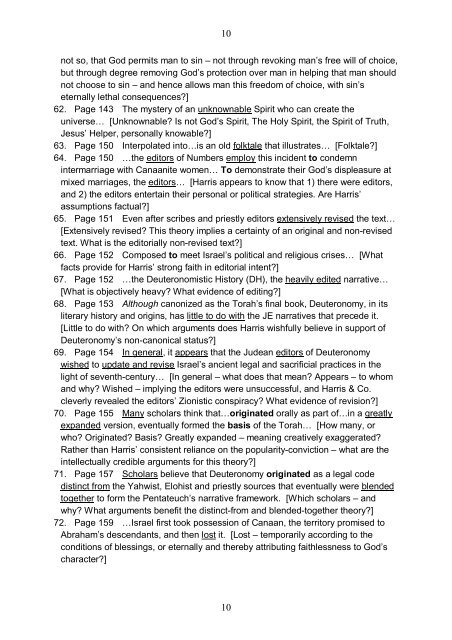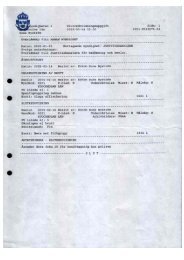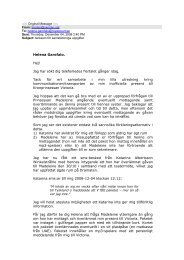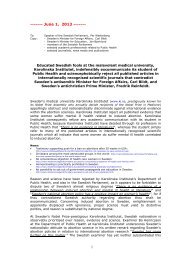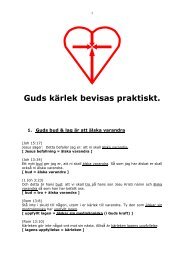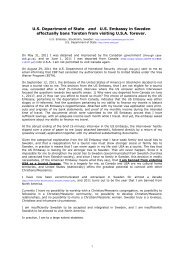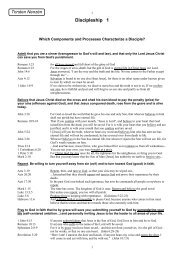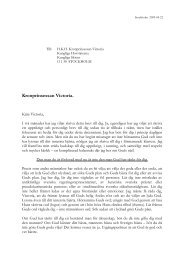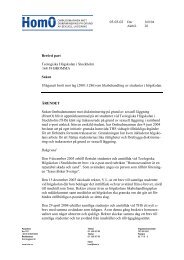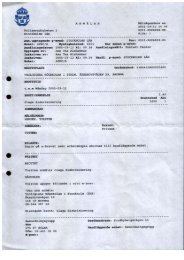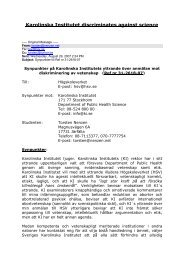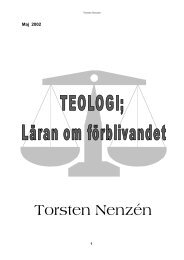THS heretical theology - Torsten Nenzen
THS heretical theology - Torsten Nenzen
THS heretical theology - Torsten Nenzen
You also want an ePaper? Increase the reach of your titles
YUMPU automatically turns print PDFs into web optimized ePapers that Google loves.
10<br />
not so, that God permits man to sin – not through revoking man’s free will of choice,<br />
but through degree removing God’s protection over man in helping that man should<br />
not choose to sin – and hence allows man this freedom of choice, with sin’s<br />
eternally lethal consequences?]<br />
62. Page 143 The mystery of an unknownable Spirit who can create the<br />
universe… [Unknownable? Is not God’s Spirit, The Holy Spirit, the Spirit of Truth,<br />
Jesus’ Helper, personally knowable?]<br />
63. Page 150 Interpolated into…is an old folktale that illustrates… [Folktale?]<br />
64. Page 150 …the editors of Numbers employ this incident to condemn<br />
intermarriage with Canaanite women… To demonstrate their God’s displeasure at<br />
mixed marriages, the editors… [Harris appears to know that 1) there were editors,<br />
and 2) the editors entertain their personal or political strategies. Are Harris’<br />
assumptions factual?]<br />
65. Page 151 Even after scribes and priestly editors extensively revised the text…<br />
[Extensively revised? This theory implies a certainty of an original and non-revised<br />
text. What is the editorially non-revised text?]<br />
66. Page 152 Composed to meet Israel’s political and religious crises… [What<br />
facts provide for Harris’ strong faith in editorial intent?]<br />
67. Page 152 …the Deuteronomistic History (DH), the heavily edited narrative…<br />
[What is objectively heavy? What evidence of editing?]<br />
68. Page 153 Although canonized as the Torah’s final book, Deuteronomy, in its<br />
literary history and origins, has little to do with the JE narratives that precede it.<br />
[Little to do with? On which arguments does Harris wishfully believe in support of<br />
Deuteronomy’s non-canonical status?]<br />
69. Page 154 In general, it appears that the Judean editors of Deuteronomy<br />
wished to update and revise Israel’s ancient legal and sacrificial practices in the<br />
light of seventh-century… [In general – what does that mean? Appears – to whom<br />
and why? Wished – implying the editors were unsuccessful, and Harris & Co.<br />
cleverly revealed the editors’ Zionistic conspiracy? What evidence of revision?]<br />
70. Page 155 Many scholars think that…originated orally as part of…in a greatly<br />
expanded version, eventually formed the basis of the Torah… [How many, or<br />
who? Originated? Basis? Greatly expanded – meaning creatively exaggerated?<br />
Rather than Harris’ consistent reliance on the popularity-conviction – what are the<br />
intellectually credible arguments for this theory?]<br />
71. Page 157 Scholars believe that Deuteronomy originated as a legal code<br />
distinct from the Yahwist, Elohist and priestly sources that eventually were blended<br />
together to form the Pentateuch’s narrative framework. [Which scholars – and<br />
why? What arguments benefit the distinct-from and blended-together theory?]<br />
72. Page 159 …Israel first took possession of Canaan, the territory promised to<br />
Abraham’s descendants, and then lost it. [Lost – temporarily according to the<br />
conditions of blessings, or eternally and thereby attributing faithlessness to God’s<br />
character?]<br />
10


